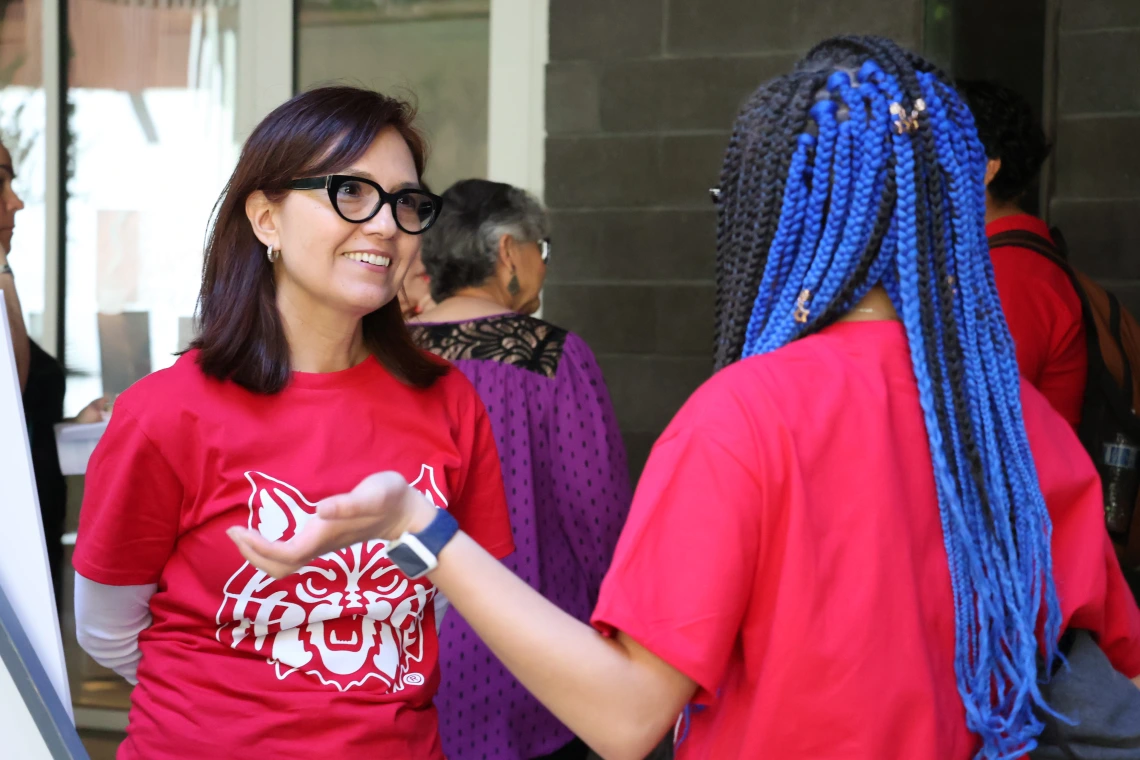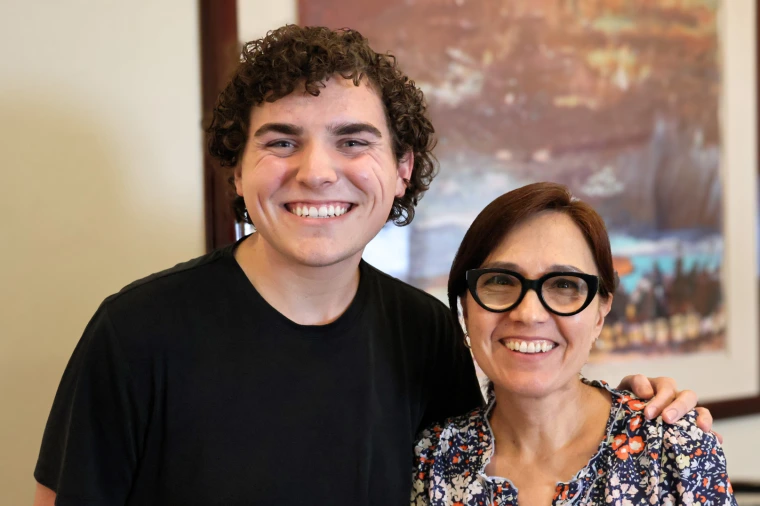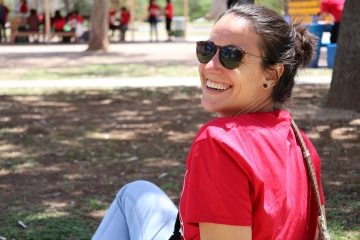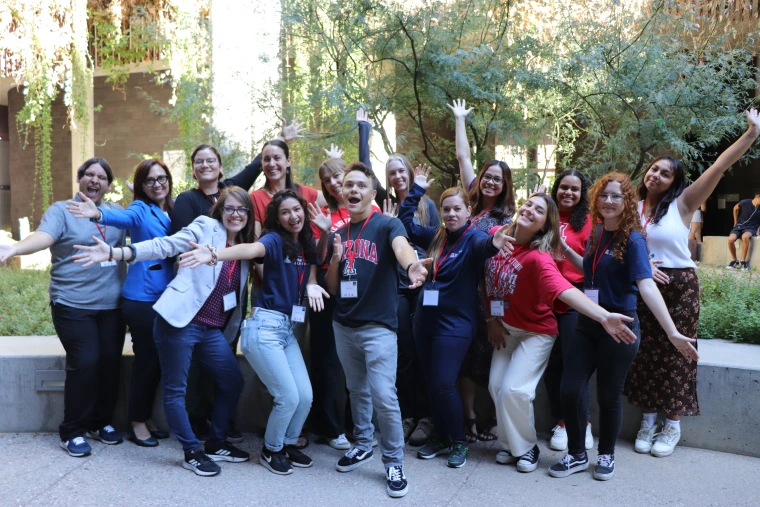Adriana Zuniga-Teran Honored with College of Social and Behavioral Sciences Outstanding Mentor Award
The Udall Center Associate Research Professor credits a community of scholars for her recognition as an outstanding faculty mentor.

When Udall Center Associate Research Professor Adriana Zuniga-Teran first read the letter nominating her for the University of Arizona College of Social and Behavioral Sciences’ (SBS) 2025 Outstanding Mentor Award, she says she was “moved to tears.” The letter, written and submitted by Udall Center Director Andrea K. Gerlak, included reflections from students Zuniga-Teran had mentored—some now professionals, others still navigating their academic paths—each expressing how her guidance had transformed their lives and careers.
“It was so emotional,” Zuniga-Teran recalls. “All these quotes from students... what it meant to work with me, how I influenced their career or their studies. It was very compelling.”
Now formally recognized by SBS for her unique approach to mentorship, Zuniga-Teran—who was also recently promoted from Assistant Professor to Associate Professor in the School of Geography, Development and Environment—says she sees the award not just as a personal accolade, but as a celebration of the community she’s worked with to develop partnerships rooted in mutual trust, collaboration, and a deep belief in the power of mentorship to change lives.
Zuniga-Teran has long emphasized a mentoring approach grounded in inclusivity, communication, and empowerment. She describes mentoring as a core part of her professional identity, not an optional or extra task. “This is what makes my job worthwhile,” she said. “Feeling recognized or valued or supported... it gives a lot of meaning to my work because I do try to help students… But I consider it my job. I don’t think it’s above and beyond.”
Her mentoring style centers on providing emotional and intellectual support to students, recognizing their individual needs, and fostering growth beyond the classroom. For her, mentoring isn’t confined to coursework or advising meetings—it extends to helping students identify professional and academic opportunities, apply for jobs, and contribute to research projects as collaborators.
A Transformative Approach to Mentorship

Zuniga-Teran’s mentoring philosophy is deeply shaped by her personal experience. As an international student from Mexico, she says she recalls needing considerable guidance early in her academic career in the U.S. Today, that experience fuels her desire to support others.
Her mentorship efforts are often embedded within research and outreach projects. Zuniga-Teran has led mentoring initiatives involving tiered models that include postdocs, graduate students, undergraduates, and middle and high school students. These models not only extend mentorship across age groups, but also build leadership skills in university students, who then serve as role models to younger peers.
“We noticed early on that youth-to-youth mentoring really helps keep younger students engaged,” she says. Reflecting on a green stormwater infrastructure project she worked on with Gerlak and others at Star Academic High School in Tucson, Zuniga-Teran explains that, to the high school students participating in the project, “the university students were role models for them.”
This approach is both practical and impactful. As a leader of many research projects, Zuniga-Teran says that much of her time is spent on structuring programs, reporting, and other administrative functions that typically accompany grant-funded research. But, by structuring the mentorship experience in tiers, she also benefits from a thoughtful division of labor while simultaneously amplifying the reach of her mentorship programs and building capacity among mentees.
Empowering Future Leaders Through Support and Collaboration
Colleagues and students alike emphasize the depth of Zuniga-Teran’s impact. According to Gerlak, Zuniga-Teran has mentored across a wide range of projects—from international student exchanges to NSF-funded research—frequently including students as co-authors on academic publications even when she is technically not the primary advisor for those students. Nearly 40 percent of her 50+ peer-reviewed publications involve student collaborators, which is a testament to her commitment to inclusive scholarship.

Postdoctoral Researcher Adrienne Brown received the 2025 U of A Postdoc-as-Mentor Award.
Udall Center Community Engagement Postdoctoral Researcher Adrienne Brown, who herself received the 2025 U of A Postdoc-as-Mentor Award, praised Zuniga-Teran for her leadership. “Her mentorship during this time has been invaluable to me,” says Brown. “Under her leadership, our teams have been able to complete multiple projects with positive outcomes... Her personal investment in my well-being and my career has also been important to me.”
Several of Zuniga-Teran’s students offered similar sentiments. 2023 Mo’s Policy Scholar Catherine Broski graduated from the U of A in 2024 with degrees in Sociology and Geography and now works as a regional planner. Broski reflected on how Zuniga-Teran’s mentorship shaped her career in planning and advocacy: “She has taught me how to problem solve from every angle…” Broski says, adding that “Her mentorship transformed the way I view the intersection of the built and social environments.”
Recognition That Reflects a Community Effort

A recent Zuniga-Teran mentoring project included several U of A students as mentors for younger students.
Zuniga-Teran sees mentorship as reciprocal—her efforts not only support students, but also help to strengthen the greater academic community. “It’s really rewarding when you help someone and then they help others... It builds a network,” she said. “It's that reciprocity that makes this work so meaningful because you have a community of people helping each other and lifting each other up.”
For Zuniga-Teran, the award affirms that her tireless dedication to mentoring matters and is seen and appreciated by her students, peers, and colleagues. “Feeling recognized or valued or supported also gives a lot of meaning to that work,” she said.
In her view, the SBS Outstanding Mentor Award also represents a shared achievement. Zuniga-Teran points out that the term “engagement” was new to her as an architect when she began working with Gerlak at the Udall Center in 2015. But, with Gerlak’s support and that of her colleagues who acted as mentors to her, she says, “I’ve made a career out of it. At first, I had to Google the word and now I write papers on engagement.”
The takeaway according to the award-winning professor: “Anyone can learn. Let’s put it like that.”
Of course, it certainly helps to have a good mentor behind you, too.

